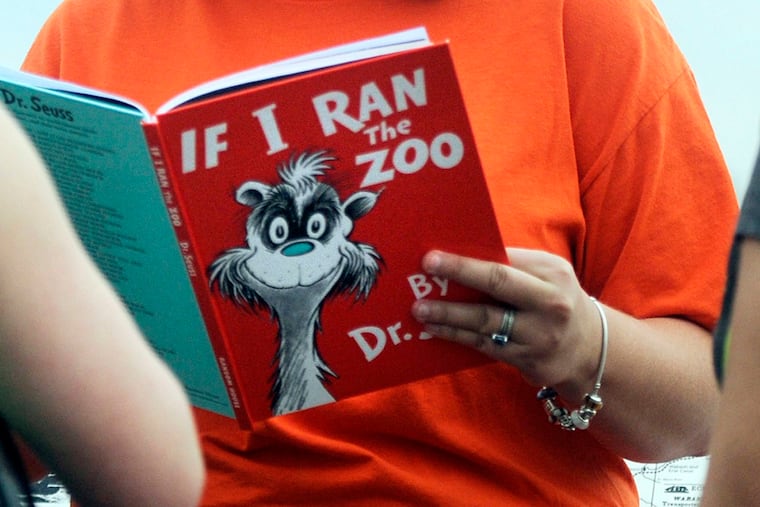Dr. Seuss did not get canceled. But if you think he did, you have a bigger problem. | Opinion
So much that’s alleged about what’s been “canceled” or “banned” is either heavily exaggerated or outright untrue.

Two things happened to me on Tuesday morning, within a few minutes of each other.
First, I saw on the news and social media that “Dr. Seuss has been canceled.” Then, on my third-grade son’s virtual schooling, the teacher informed the class that it was Dr. Seuss’ birthday, and that the kids would all be writing letters that day celebrating what Dr. Seuss’ work had meant to them.
Whatever “cancellation” the late children’s author has suffered, it’s clearly been somewhat less than universal.
» READ MORE: Publication of six Dr. Seuss books is being halted because of racist images
This is just another example of something that’s happened over and over again in the “cancel culture” debates of recent times: So much that’s alleged about what’s been “canceled” or “banned” is either heavily exaggerated or outright untrue.
Here’s what actually happened with Dr. Seuss: Last week, a single school district in Virginia announced not that they were “banning” the author’s books, but rather that were “de-emphasizing” them on “Read Across America Day,” an annual occasion that’s long been timed to Seuss’ birthday. The Loudoun County schools, however, did not remove Dr. Seuss’ books from their libraries.
Then, on Tuesday, Dr. Seuss Enterprises, a business controlled by the author’s estate, announced that it had made the decision last year to take six of Dr. Seuss’ books — And to Think That I Saw It on Mulberry Street, If I Ran the Zoo, McElligot’s Pool, On Beyond Zebra!, Scrambled Eggs Super!, and The Cat’s Quizzer — out of print. The stated reason was that “these books portray people in ways that are hurtful and wrong.” This includes several instances of what today would be considered racist imagery.
We can debate whether doing this was the right thing, but it’s important to point out a few things. The decision was made by the company that owns and controls the books, not by the government, or by a “mob” that pressured it.
Also, these are far from Dr. Seuss’ most popular or significant works. The printing of The Cat in the Hat, The Lorax, and Green Eggs and Ham will remain unaffected. Those graduating from high school will likely continue to receive multiple copies of Oh, the Places You’ll Go! as gifts.
Additionally, the decision merely stopped new printing, and did nothing to take existing copies of the books out of circulation. And to Think That I Saw It on Mulberry Street was first published in 1937, so there are likely plenty of copies out there. If anyone wants to order any of these “canceled” books, they can probably get a copy delivered to their door by tomorrow.
But all that didn’t stop Rep. Kevin McCarthy of California, the House minority leader, who said on the floor of the House on Tuesday that “first, they outlaw Dr. Seuss and now they want to tell us what to say.” Or Fox News from making the Seuss “cancellation” a focal point of its news coverage for the better part of a day.
» READ MORE: Barnes & Noble’s botched Black history efforts make a mockery of true efforts toward inclusion | Opinion
It’s not just Dr. Seuss. You probably heard, last month, that “Mr. Potato Head has been canceled.” In truth, parent company Hasbro had merely announced a change in the overall brand name to “Potato Head,” while making no changes at all to the Mr. Potato Head or Mrs. Potato Head characters. Disney, when it recently added the entire run of The Muppet Show to Disney+, placed brief disclaimers on a handful of episodes, citing “negative depictions of cultures,” but making no other changes to the shows. This got turned into “they banned the Muppets!”
Still, by this point, we’ve probably all seen Facebook posts claiming the outright banning of Dr. Seuss, Mr. Potato Head, and the Muppets.
But it’s possible to grapple with the more problematic aspects of Dr. Seuss’ legacy while also appreciating his good and enduring works. And the author’s books, rather than being “banned,” remain available all over the place, from Amazon to my own kids’ school. For politicians and media figures to lie about what’s happened is much more worthy of scorn than the actions of the Seuss estate.
Stephen Silver is a journalist and film critic who lives in Delaware County.